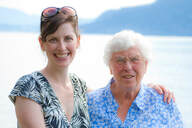 My grandmother, Gerarda Boerboom Bunyan, died last night. She was 94. She taunted Nazis in the occupied Netherlands, raised four children almost single-handedly, and sewed better than anyone. I wrote this short piece about her a few years ago. It's no longer available at the CBC site, so I'm posting it here as a small memorial. Pig (For Oma) Carry the dead pig beneath your dress and sweater but above your undervest, so it doesn’t touch your skin. You knitted the sweater yourself from the poor remains of three old ones. It’s all lumps. Though you didn’t plan it to shroud an animal. In the evening your mother stands in the dim doorway with her glasses glittering and has you write to tell your aunt about the litter of only two, one stillborn, one sick. You couch this in a page about your studies, your cleverness. Your aunt writes back: their sow has littered too. Eight, all living. It might as well be an official report, as everything must be reported now: livestock births, deaths. The letter goes on to complain carefully of the children, the clouds, the shift in the taste of the well water. As if your aunt’s pigs too are nothing. As if you weren’t paying attention. Go to the north of the country with the dead pig. Don’t look back at your mother’s face. Get to the farm in the morning, eat porridge with your cousins, leave the small body next to the great hill of sow and swarming piglets in the shed. When you go, don’t look at your aunt with her hand over her hair, only sing Goodbye. The feel of the new pig, the trade, shifting under your sweater all the way back to the train station, insistently alive. Two Nazi soldiers in your carriage. All Dutch pigs belong to them. All the pigs of the world, all pinkness, all squeals, all flesh. One of the young men has broken blood vessels in his cheeks, one picks at the dimple in his chin. Both have guns, easy hands, painful uniforms. Think of your neighbours who were taken; you went inside their empty house and stole a spoon from the kitchen drawer. It has an O stamped on the handle. The Germans’ eyes travel the carriage. You smile and hug your fat stomach, fiercely happy. You wish, almost, that they could see through your sweater to the pig, see exactly what you are doing. Perhaps Nazis have X-ray eyes; who knows what they have? They have everything. Your heart is beating in your stomach. The pig nestles into it, the beating. The train sways, the Nazis set to talking. Ja, nein. You know German now, but you don’t think in it. Think in Dutch of what you will do, how you will train the pig to be silent, how you will keep it in the dark, in a pit dug in the yard with dirt flung over its wood cover. Never talk to it. Hit it with a stick if it makes noise. Feed it on grass and whatever scraps you can spare. In Amsterdam, everyone is starving. In the village, you can hide potatoes if you’re careful about it. You hold yourself in. The pig is trying to suck at your vest buttons. Let it.
0 Comments
Leave a Reply. |
ALIX HAWLEYI'm the author of My Name is a Knife, All True Not a Lie In It, and The Old Familiar. Archives
February 2021
Categories |
 RSS Feed
RSS Feed
